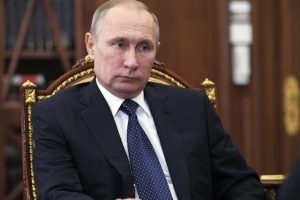Just as with Britain, which once ran an empire, a lively business in insults flourishes for America, the world’s richest, most militarily-powerful country. The newest witticisms are aided by suspicions that the United States is in a state of moral, political and economic decline. But even a century ago, a French prime minister was caustically noting that America had gone from barbarism to degeneration without the usual interval of civilisation, and a renowned Irish playwright was lamenting that anyone 100 per cent American was 99 per cent idiot. Mark Twain, a son of the soil, had great fun suggesting that while it was wonderful to find America, it might have been more wonderful still to miss it.
But perhaps the most consistent and cruel jibe of all has involved America’s high-handed attitude to the world order and its low meddling in other countries’ affairs. The US has intervened so many times in so many countries in the past 70 years that the most popular joke is grim: why has there never been a coup in the United States? Because there’s no US embassy in Washington.
By implication, it is the US that has always overtly or covertly played the role of overseas change-maker and it has done so by cynical means, using a range of tactics that include base propaganda, big bucks and brutal assassinations.
No longer. US intelligence agencies allege that Russia influenced the 2016 presidential election, which leaves America in an unusual position. For the first time, it sees itself as the victim of a successful dirty tricks foreign operation, which materially influenced the course of its domestic political affairs. The key word in that last sentence is “successful”. US presidential candidate Henry Wallace’s 1948 bid for the White House may have been largely run by communists, but it failed.
Even so, American caterwauling has garnered little overseas sympathy. Its claims to victimhood have evoked strong and hostile emotions around the world and in the US. Some of the more idealistic supporters of Democratic presidential candidate Bernie Sanders have decried America’s history of foreign meddling. Meanwhile, the foreign reaction ranges from malicious glee to a rather more moral argument — what goes around comes around. After having influenced countless elections in other countries, the US is seen to be finally getting a taste of its own medicine. It would be inaccurate to say there is no empathy — many countries have been in the same situation — but there is little discernible sympathy for America’s woes.
The reasons are obvious. From Honduras as recently as 2009, to Haiti further back, from Iran in the 1950s to Indonesia in the 1960s and Italy many times over, the US has intervened in internal politics in many countries.
In his recently published research innocuously titled Partisan Electoral Interventions by the Great Powers, Dov Levin of Carnegie Mellon University, counted up more than 80 US interventions in foreign elections between 1946 and 2000. When he added in the USSR/Russia, the total came to 117 electoral interventions, “one out of every nine competitive, national-level executive elections”.
Mr Levin did not count non-electoral attempts at regime change, such as coups. Instead, he focused on creating a data set of “partisan electoral intervention by the great powers”. For this he used primary and secondary sources, including formal US Congressional investigations of CIA activities, declassified internal CIA histories and CIA officers’ and other US officials’ memoirs. For the Soviet/Russian interventions, he primarily consulted the Mitrokhin Archive, notes kept for over 30 years by a KGB archivist who defected to Britain.
After poring over the data, Mr Levin was able to arrive at a very definite conclusion. As he says, “the United States is the most common user of this technique”. Russia or the Soviet Union used it half as much, while the Chinese and the Venezuelans under the late Hugo Chavez employed it only sometimes.
There is little reason for the US to feel aggrieved that it is hoist with its own petard. That said, it may be shortsighted to celebrate America’s predicament. What the US did to others was as wrong as the wrong it alleges has now been done to it. There are dangerous implications for democracies around the world or, at least, for the future of competitive elections.
In 2014, the US-based NGO Freedom House found that competitive elections were a significant feature of domestic politics in more than half of the states of the world. It stands to reason then that non-violent disruption of democratic choices will become an increasingly important tool in the geopolitical great game. That realisation would probably spur a countermove towards less electoral competitiveness in countries that fear intervention. This can hardly be good for the idea of democracy.
Consider Russian president Vladimir Putin’s response to the media late last year when asked about early elections. “In which country?” he quipped. It was a witty reference to claims that Moscow interfered with the US election and may be preparing to meddle in the Netherlands, France and Germany too.
It was Mr Putin’s little joke, but probably too close to the serious business of the day to be rip-roaringly funny.
There really is nothing to cheer about America’s predicament.


